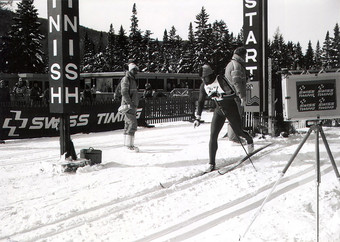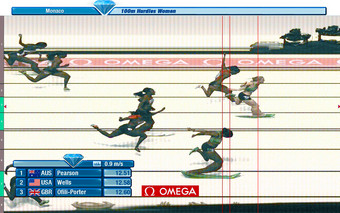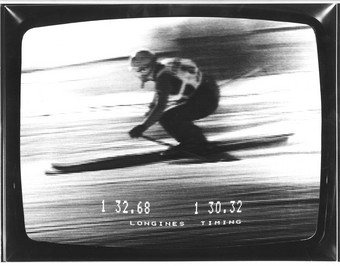History
The history of Swiss Timing
Although Swiss Timing as an independent entity was officially founded in July of 1972, its roots can be traced back more than a century to the earliest sports timekeeping activities of its sister brands, Omega and Longines.
Omega was on hand as official timekeeper at the Gordon Bennett Cup balloon race in 1904, the first documented occasion of the brand lending its services to sport. Omega’s services came of age in Los Angeles in 1932 when, for the first time, a single company was responsible for the timekeeping of every event at an edition of the Olympic Games.
That partnership with the International Olympic Committee was an important one in the development of modern sports timekeeping and it remains a cornerstone in the Swiss Timing story. Working closely with its sister brands, it has delivered state-of-the-industry timekeeping and data handling solutions to the world’s highest-profile sporting event.
Longines had also served as Official Timekeeper at the Olympic Games either on its own or with Omega. The brand from St. Imier also has a long history in its support of alpine skiing, motor racing and, famously, equestrian sports.
Encouraged by the Federation of the Swiss Watch Industry (FH), sports timing specialists from the two brands joined forces and signed the founding documents of Swiss Timing in July of 1972 in Biel. But it wasn’t until 1988 that the Longines Timing team merged with Omega Sports Timing under one roof at Swiss Timing.
In the years since, other Swatch Group brands - including Swatch, Tissot, Blancpain, Certina, and Rado - have also commissioned Swiss Timing to work on their behalf at the sporting events most associated with the brands.
Technological evolution . . . and revolution
It is remarkable to consider the evolution of timekeeping technology and services since Omega first assumed timekeeping responsibilities in 1932. The 30 split-second chronographs used in Los Angeles have been replaced by 450 tons of state-of-the-art equipment, 175 kilometres of cable and optical fibre, and 70 display boards at the London 2012 Olympic Games. No fewer than 450 technicians, supported by some 800 trained volunteers, were dispersed among the 31 Olympic venues in the capital and its surroundings.
A commitment to sport
Working closely with the governing federations of more than 100 sports, Swiss Timing engineers, sport managers, and specialists are committed to creating timekeeping and data handling technologies and processes that are equal to the ever-changing requirements of a broad range of events and sports.
In the company’s history, these have included such breakthroughs as photoelectric cells, Scan’O’Vision photofinish cameras, touch pads in swimming pools, and starting blocks with false start sensors. And every year, new technologies are introduced to serve the sporting federations and event organizers, to record the incredible performances of the world’s best athletes, and to inform spectators and fans around the world.
An admirable contradiction of the heart and mind
The world is passionate about sport and as Nick Hayek, President of the Group Management Board of Swatch Group, has said, “Sport is a blend of pure emotion and absolute irrationality mixed with moments of absolute precision, complete objectivity, and black and white results – an admirable contradiction of the heart and mind. Swiss Timing has been an exceptional ambassador.”
The company has always been proud of that role.
Świat gier online jest rozległy i zróżnicowany, a jednym z najpopularniejszych gatunków są gry slotowe. W szczególności automaty owocowe są ulubionymi od wielu lat, nawiązując do wczesnych dni mechanicznych automatów do gier w tradycyjnych kasynach. Dla polskich graczy urok tych kolorowych, wypełnionych zabawą gier nie różni się niczym od graczy z innych krajów, a era cyfrowa sprawiła, że gry te są bardziej dostępne niż kiedykolwiek.
Owocowe sloty charakteryzują się żywymi symbolami wiśni, cytryn, pomarańczy i innych owoców. Prostota ich konstrukcji, w połączeniu z łatwymi do zrozumienia liniami wypłat i często nostalgicznymi dźwiękami, przyciąga zarówno doświadczonych graczy, jak i nowicjuszy. Podczas gdy tradycyjne automaty owocowe były proste, nowoczesne iteracje dostępne dla polskich graczy często zawierają dodatkowe funkcje, takie jak symbole Wild, symbole Scatter i rundy bonusowe, dodając warstwy emocji do rozgrywki.
Zaletą darmowe gry hazardowe owoce jest to, że często są one dostępne w darmowych wersjach. Te darmowe gry pozwalają graczom cieszyć się emocjami związanymi z grą bez obstawiania prawdziwych pieniędzy. Dla polskich graczy jest to okazja do ćwiczenia, zrozumienia mechaniki lub po prostu cieszenia się spokojną grą bez stresu związanego z potencjalną stratą finansową. Darmowe sloty są również świetnym sposobem dla nowych graczy na zapoznanie się z cyfrowym interfejsem, zapewniając, że kiedy lub jeśli zdecydują się postawić prawdziwe pieniądze, zrobią to z pewnością siebie.




